Michigan State’s Independent Voice
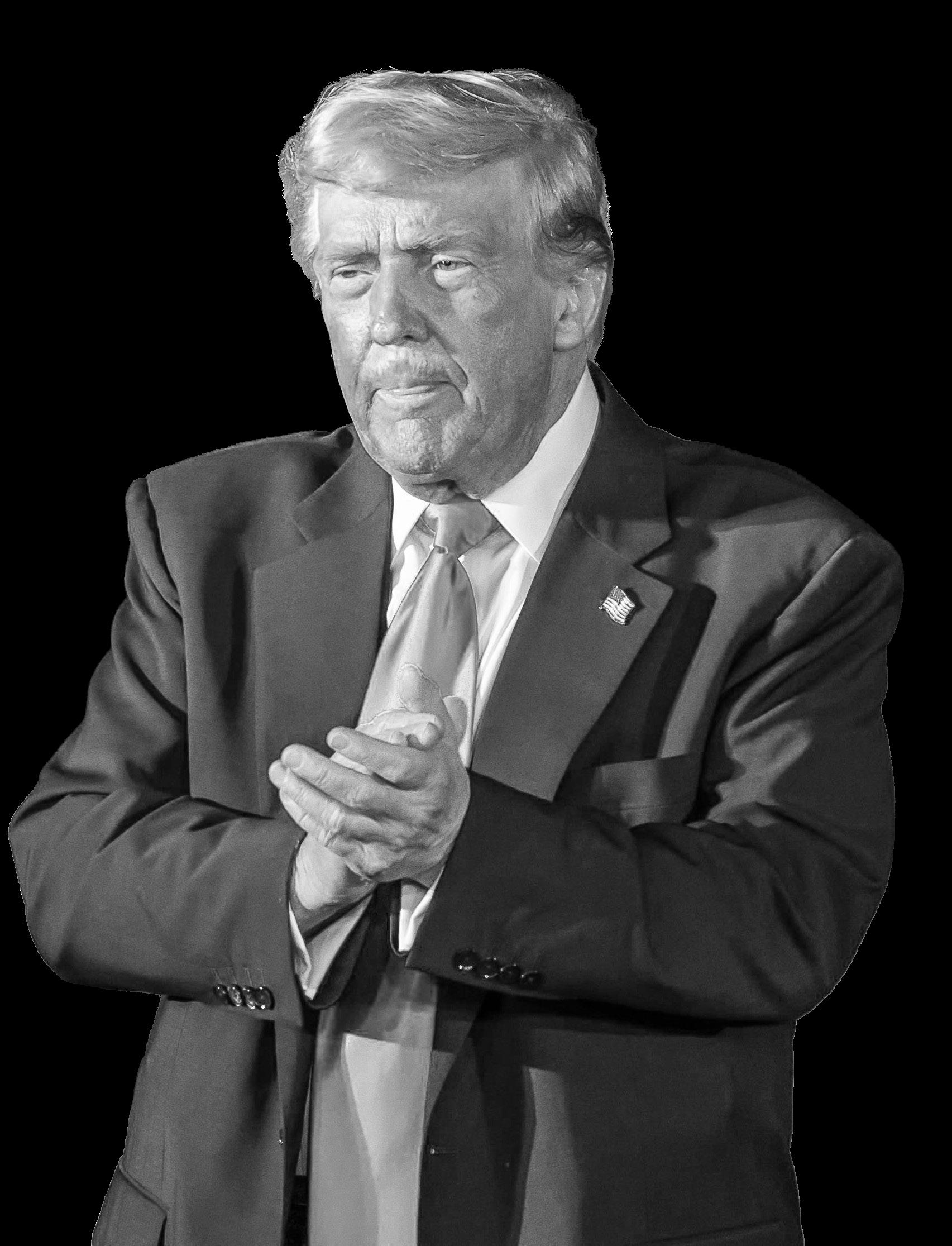

Michigan State’s Independent Voice

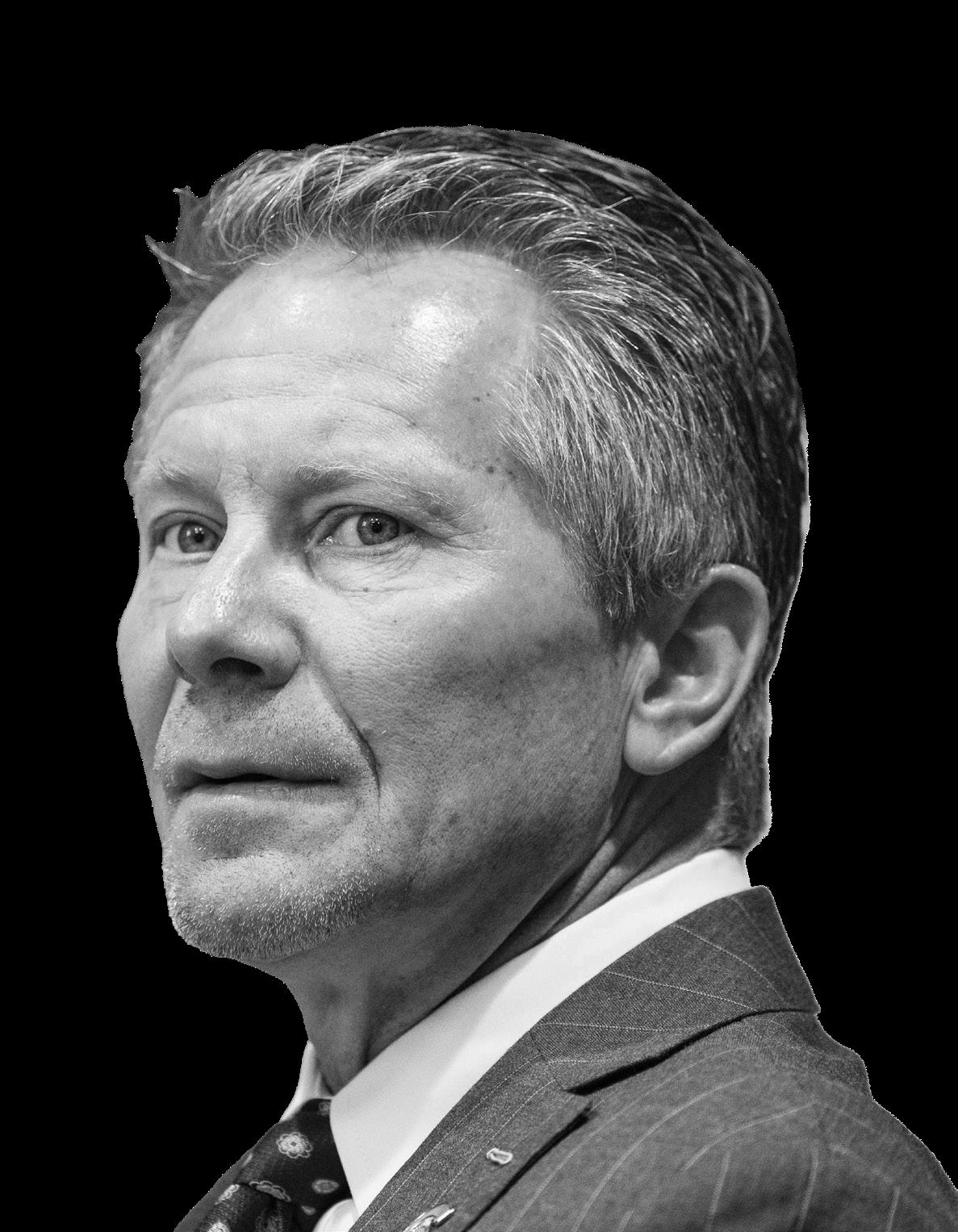
As the Trump Administration attacks universities, MSU is trying to stay above the fray









For over 50 years, Better Health Market has ofered the MSU community a better selection of vitamins, supplements, natural foods, organic groceries and more—all at better prices. Not to mention sound advice from our nutrition experts.















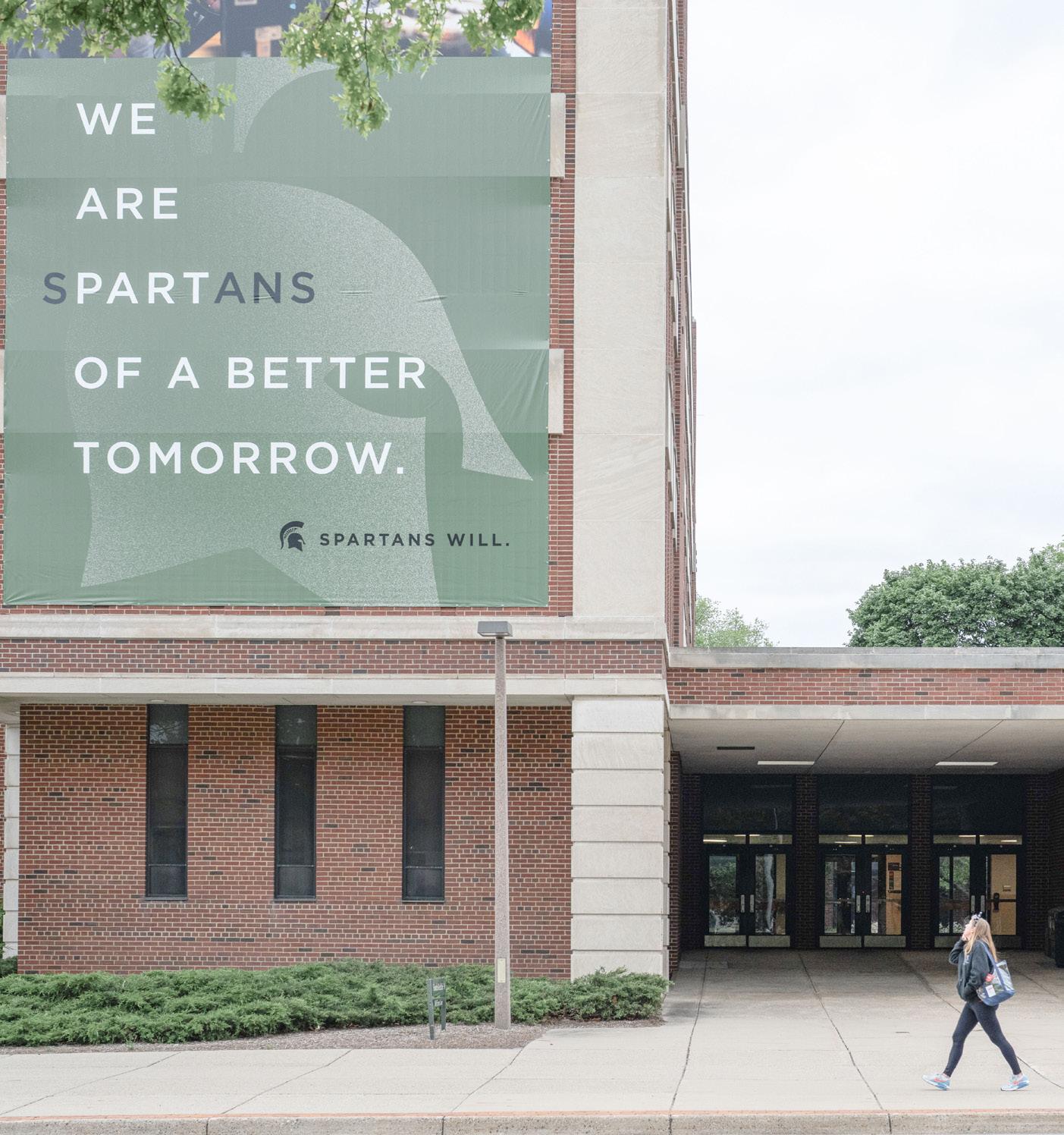

By Somer Sodeman ssodeman@statenews.com
Michigan State University was featured in an advertisement aired during season-opening Big Ten football games late last month that touted the societal value of the conference’s universities amid federal funding cuts to higher education.
The ad, titled “We Are Here,” ran during each game broadcast on the Big Ten Network as well as the Peacock-streamed game during college football’s opening weekend. The conference said it is committed to giving the spot a robust airing over the course of the full season.
It is the frst in a three-part series of advertisements, which will include footage from all 18 Big Ten universities. MSU spokesperson Amber McCann said the campaign also ran this weekend.
“Nearly six decades ago, a research breakthrough at Michigan State University changed how the world treated cancer,” President Kevin Guskiewicz said in a press
release announcing the ad. “Today, research at MSU ranges from developing new treatments for pancreatic cancer, to enhancing security by testing the next generation of microchips, to developing more resilient crops that help lower food costs.”
“I am thrilled to see the Big Ten Conference help spread the word about the impact of universities like MSU on communities across the country and around the world,” Guskiewicz said.
The ad comes as the Trump administration’s cuts to student aid, loan programs and research funding are taking shape at MSU and universities across the country. It also follows sustained calls on campus for university administration to push back on such measures.
When asked whether the ad was made in response to those pressures, McCann, the spokesperson, said it came from a “desire by conference members to showcase the impact” of Big Ten schools on education, innovation
and economic growth.
The goal is to reach beyond students and campuses to raise awareness about “the critical work taking place at America’s research universities,” she said.
Because the ad ran on the Big Ten Network, McCann said there was “no specifc cost” to MSU or the conference for the airtime.
The ad follows MSU’s own “Research for You” campaign, launched earlier this year to argue for the importance of the institution’s work. “From lifesaving cancer drugs that treat millions to advancements in agriculture that help deliver healthy food to the kitchen table, Spartan research makes life better,” a webpage for the campaign said.
The website continues, “The federal government’s decadeslong partnership with MSU provides vital funding for research breakthroughs and technologies while also ensuring the university is preparing the next generation of leaders to meet tomorrow’s challenges.”


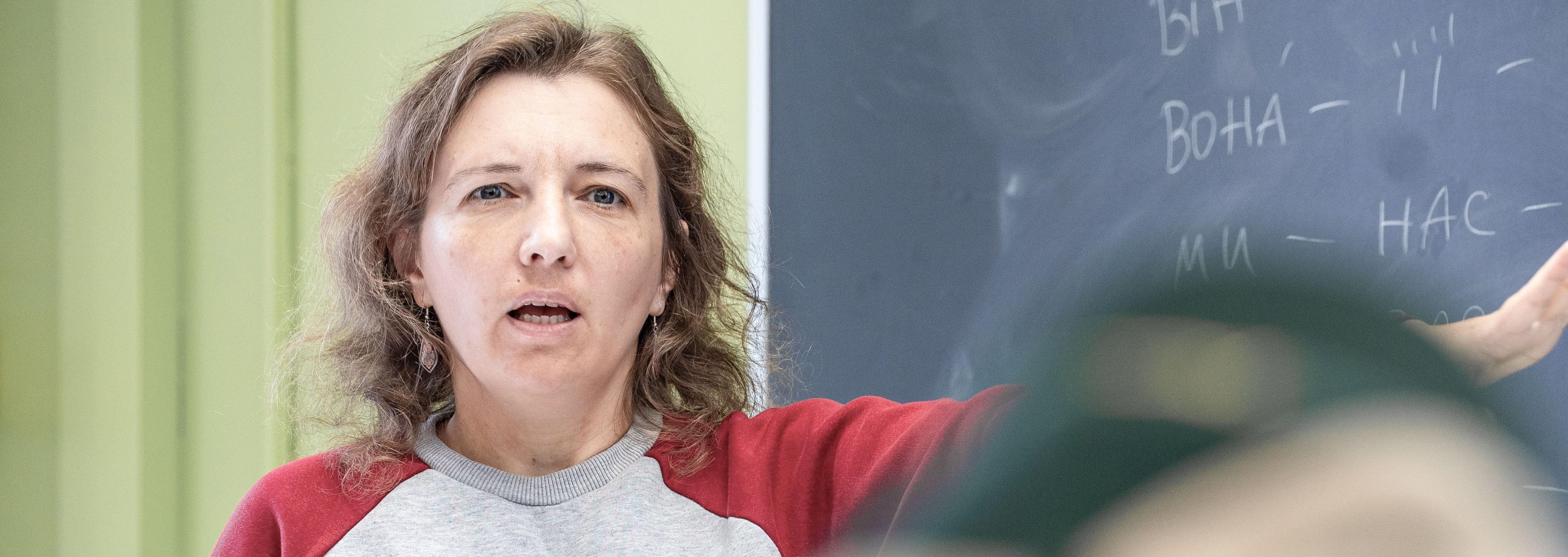
By Owen McCarthy
omccarthy@statenews.com
Such limited understanding of the Eastern European nation — colored by years of headlines about war and destruction — is what Borodin




“It would be one of the few American universities to offer Ukrainian at a time when there is a considerable need for American students to know more about Ukraine,” said Matthew Pauly, associate professor of history, who is Borodin’s faculty host. He added that knowledge of the language can “offer a much more comprehensive understanding of Russia’s war against Ukraine.”
MSU’s offering comes as the Russian government reportedly suppresses Ukrainian in parts of the territory it occupies, but follows a spurt in global interest in the language brought on by Russia’s 2022 invasion.
Unique as the opportunity may be, few are enrolled in the class. On a recent Friday afternoon, Borodin jumped straight into instruction at 3:50 p.m. sharp in front of a thirdfoor classroom in Wells Hall with three students.
It’s a far cry from Borodin’s experience teaching in Poland, where she fed after Russia’s full-scale invasion of Ukraine in 2022. Borodin said, being “neighbors,” plenty of Polish students took her class, hoping to parlay their skills into careers as interpreters, businesspeople and politicians.
Borodin said that U.S. students, too, would do well to learn Ukrainian. She anticipates the country will remain a central player in global politics, meaning that, in turn, there will be ample opportunities for U.S. students to use the language in prospective careers. Though the class only became available after many undergraduates had already enrolled in fall classes, Pauly said, he wishes more would seize the opportunity in the spring semester.
Over the weekend, Russia unleashed its largest drone strike on Ukraine to date since the start of its full-scale invasion in 2022, killing several around the country and damaging a government building in the capital city, Kyiv, the New York Times reported.
Though the crowd in Borodin’s recent Friday afternoon class was small, it was engaged.
At the class’s outset, Borodin displayed a slideshow with pictures of Barack Obama, Queen Elizabeth, Brad Pitt and Angelina Jolie with Ukrainian sentences underneath them, including blanks. The students pondered the missing words and took turns dictating to Borodin, who nodded, gave clues when a term evaded them and congratulated them upon completion.
Later, she handed out a worksheet with the lyrics to a song by the popular Ukrainian rock band Okean Elzy. She proceeded to play the track from her cellphone as the students hunched over their papers, listening intently to fll in blanks in the lyrics. After the labor, Borodin shut off the lights and the class watched the song’s accompanying music video.
Graduate Student Megan Cheperuk — who is working on a dissertation on notions of statehood among 20th century Ukrainian thinkers — said she appreciated the exercise.
“Listening is the hardest thing for me,” she said after class. “So it’s actually really helpful to hear the song and actually have to fll in the blanks, because then I can recognize the words better.”
Borodin arrives at MSU during a time of heightened sensitivity around academic freedom at American universities. President Donald Trump has taken an unprecedentedly direct interest in the curricula of universities and has pressured some to change theirs to come into closer ideological alignment with his administration.
But such concerns don’t seem to be in the minds of Borodin or her students. While it’s thorny to translate discussions of some hotbutton issues to the classroom in today’s political climate, that’s not much of a consideration in Borodin’s class.
For Cheperuk, “With Ukraine, it’s more the fact that people have kind of just become turned off to it, and they don’t really care anymore.”
“It’s more trying to get people’s attention,” she said.

By Alex Walters, Owen McCarthy awalters@statenews.com
omccarthy@statenews.com
Michigan State University is caught in a dilemma.
On one hand, it’s shouldering an attack unlike anything in recent memory. A long-simmering distrust of higher education has manifested into action, with President Donald Trump’s administration leveling massive funding cuts, wide-ranging investigations, and restrictive executive orders against universities. For some, the perilous moment demands a full-throated rebuke from campus leaders.
But at the same time, standing up has proven dangerous. The most outspoken institutions have become the hardest-hit targets.
That tension looms large when MSU’s leaders have discussed their response, according to people with knowledge of the deliberations.
The university is undoubtedly hurting, both in terms of its fnancial wellbeing and autonomy to handle international admissions and issues of equity as it pleases. Doing nothing is off the table, the people said, but there are fears that pushing back too hard could invite painful retribution.
So, MSU has opted to act carefully and speak sparingly, trying to fght where it can without drawing too much attention, according to the people, who spoke on condition of anonymity to discuss the private deliberations.
President Kevin Guskiewicz has likened his strategy to “threading a needle,” they said.
Whether that balance can hold remains to be seen. But, eight months into the onslaught, MSU has been able to largely stay above the fray.
“They’re trying not to draw any attention to themselves for anything that might cause the administration to look at them,” said Jim Finkelstein, a George Mason University professor emeritus who studies college leadership. Michael Harris, a professor of higher education at Southern Methodist University, called MSU’s strategy a “very logical calculation.”
“Let’s not become a target,” he said.
Since Trump took offce in January, MSU’s leaders have given occasional interviews to discuss the value of the country’s public universities, issued statements to campus about shifting federal higher education policy, and even signaled enduring support for embattled diversity, equity and inclusion policies.
But their words have been measured, and are usually focused on explaining new policies and their effects, not indicating whether the university supports them.
And, there’s one thing they almost never include — Trump’s name.
The nominal omission is intentional, according to one of the people; It helps to ensure those receiving MSU’s messages don’t react politically and factor in whether they support the
president, they said.
The unfappable veneer, though, does not mean the institution hasn’t been quietly advocating for itself.
A memo sent to deans, directors and chairs in May lays out the playbook, after noting how “rapid and farreaching changes” by the Trump administration “directly impact [MSU’s] operations, policies and, most importantly, our people.”
“What would statements do?”
Tom Ginsburg Faculty director of the University of Chicago’s Forum on Free Inquiry and Expression
Rather than speak alone about the challenges MSU was facing, one strategy entailed “joining peers nationwide” in signing a statement by the American Association of Universities and Colleges “calling for constructive engagement on federal education policy.”
The strength in numbers tact has defned MSU’s approach to legally challenging Trump’s actions, too. The university disagreed with his administration’s move to slash the amount of money it provides for overhead costs associated with National Science Foundation-funded research. MSU’s way of pushing back: “National higher education
associations that MSU belongs to have fled a lawsuit to challenge this directive,” the memo said.
Then, there’s MSU leaders’ trips to talk to lawmakers. Guskiewicz went to Washington D.C. on “two critical occasions in April to meet with several members of the Michigan delegation, highlighting the impact of recent federal developments and advocating for international students, student aid and research support,” the memo said.
The university asked students, faculty and alumni to join the fray as well, encouraging them to use its online platform “Spartan Advocate” to contact elected offcials and “share how federally funded research and financial aid have impacted their lives.”
MSU has also spent heavily on professional lobbyists this year. Data from the campaign fnance nonproft OpenSecrets shows the university spent $220,000 in the first two quarters of 2025. The last time MSU spent that much in the frst half of the year was 2018, amid congressional oversight and investigation of its handling of the Larry Nassar sexual abuse scandal.
The strategy may not score points with those who demand a public chiding of Trump, but it could prove more effective in the long run, said Tom Ginsburg, faculty director of the University of Chicago’s Forum on Free Inquiry and Expression. “People will say, ‘If you’re not speaking out, then you’re with them!’ Well, that’s not right.”
“There is so much pressure on presidents to speak,” he said. “But there are lots of ways to defend the university that have nothing to do with using a megaphone.”
When MSU has spoken out in recent months, they’ve focused narrowly on making the case that federal and state support of universities brings a broad return on investment.
Amid “federal transitions” that “effect” the institution’s research capacities, MSU has looked to “improve [its] storytelling efforts around the impact our research has on society,” said spokesperson Emily Guerrant.
The case is made most fully on a new university webpage titled “Research For You.” In a video clip on the site, Guskiewicz explains how a research breakthrough at MSU led to the creation of the chemotherapy drug Cisplatin. There’s also a collection of links to articles by the university’s publication, MSU Today, with titles including “Food On Your Table,” “Thriving Schools,” and “Smarter, Safer Transportation.”
The message has been amplifed by the Big Ten conference. MSU joined its peers to argue their societal signifcance in a recent advertisement, aired during opening week football games, titled “We Are Here.”
The messaging is not just “the best call” for the current moment, according to Harris, the SMU professor — “if we’d been doing it for the last
10 years, we might be in a different boat right now.”
Some academics have complained about the ways the Trump administration’s efforts have hurt them personally or stifed their research, but “the general public doesn’t care about that,” he said. By contrast, the argument that university research improves the lives of everyday people helps to “undercut the argument of ‘we’re wasteful, we’re woke.’”
Still, there are doubts about that kind of communication. Cheerleading the value of universities instead of condemning the challenges they face may carry less risk, but it may not be enough to sway public sentiment.
“Do you address the elephant in the room?” said Finklestein. “Or, do you hope people read between the lines and fgure it out? Not to belittle football fans, but a lot of people aren’t smart enough to fgure it out.
“I really don’t think running an ad
on research during a football game is enough. When that ad comes on, people get up, go to the fridge, and get another beer.”
The reserved messaging comes after years of pointed talkativeness from college leaders. Starting around 2015 and swelling in recent years, it’s become common for colleges to make statements on the issues of the day.
Under President Samuel Stanley, MSU issued statements supporting the Black Lives Matter movement and condemning the Jan. 6, 2021 insurrection and Russia’s invasion of Ukraine. Only the insurrection statement remains on university webpages, though Guerrant, the spokesperson, said the others were not purposefully removed, rather affected by a broader “web migration.”
Other universities issued statements in support of access to abortions
following the overturning of Roe v. Wade, or offering support to their campus ahead of oral arguments in a U.S. Supreme Court case on the status of the “DACA Dreamers.”
On many campuses, there is now more pressure than ever for presidents to make similarly declarative assertions about the Trump administration. But Ginsburg said the constant statements are part of what got universities into this situation in the frst place.
Institutions’ pronouncements on contentious issues eroded trust in higher education, giving way to Trump’s election and ability to attack the sector so forcefully, Ginsburg said. Now, universities should embrace policies of “institutional neutrality,” a philosophy his center at UChicago champions and is credited with creating.
Over 100 universities have adopted such guidelines in recent years,
including MSU. Its policy — dubbed “thoughtful restraint” — discourages statements that ascribe opinions on contentious issues to the university, except when they directly threaten MSU’s core mission.
Trump’s higher education policies are a diffcult test of that thinking, Ginsburg said. On one hand, many of his moves would appear to quite clearly weaken MSU’s ability to teach and research. On the other hand, it’s a politicized topic, with strong feelings on both sides. Acting behind-thescenes while putting on a measured public face might be the best way forward, he said.
“I’m sympathetic with university leaders who don’t want to stick their heads out of the foxhole right now,” Ginsburg said. “Because, what would statements do? It would make some people inside the university feel better, but it wouldn’t change anything for the better. It would probably make
things worse.”
Such silence can get awkward. For example: What should a university do when the U.S. President ousts one of its highest-profle faculty members from the Fed over unproven claims of mortgage fraud, leading to a highstakes legal battle with sweeping implications for the country’s system of checks and balances?
MSU decided to say nothing when such a confict arose between Trump and professor of economics and international relations Lisa Cook — except to confrm she was still on unpaid leave, and that no one from the university had spoken to her.
“I think reasonable minds could come to different conclusions,” Harris said of the choice not to speak publicly about Cook. “You could say this does not directly impact the university, but I imagine faculty colleagues would prefer there to be more vocal support.”
above the fray amid mounting battle between Prof. Lisa Cook,
By Anish Topiwala atopiwala@statenews.com
As a high-stakes dispute escalates between President Donald Trump and a Michigan State University professor, the institution appears to be staying above the fray.
Lisa Cook, a tenured professor of economics and international relations through the College of Social Science and James Madison College, was appointed to the Federal Reserve Board by President Joe Biden in 2022. Then-MSU President Samuel Stanley touted the news at the time, saying Cook’s nomination “embodies the excellence of our Spartan faculty as she is well on her way to shatter another glass ceiling as the frst Black woman to serve on the Federal Reserve Board of Governors.”
In late August, Trump announced on social media he’d fre Cook, if she didn’t voluntarily resign, following an administration offcial’s allegation that she committed mortgage fraud. Cook did not resign, and Trump said Monday he’d offcially terminated her. Now, Cook — who worked at MSU for nearly two decades before being named to the Fed — is lodging a legal battle against the president claiming insuffcient justifcation for the termination and a lack of due process. The case is expected to force judges to parse the degree to which the
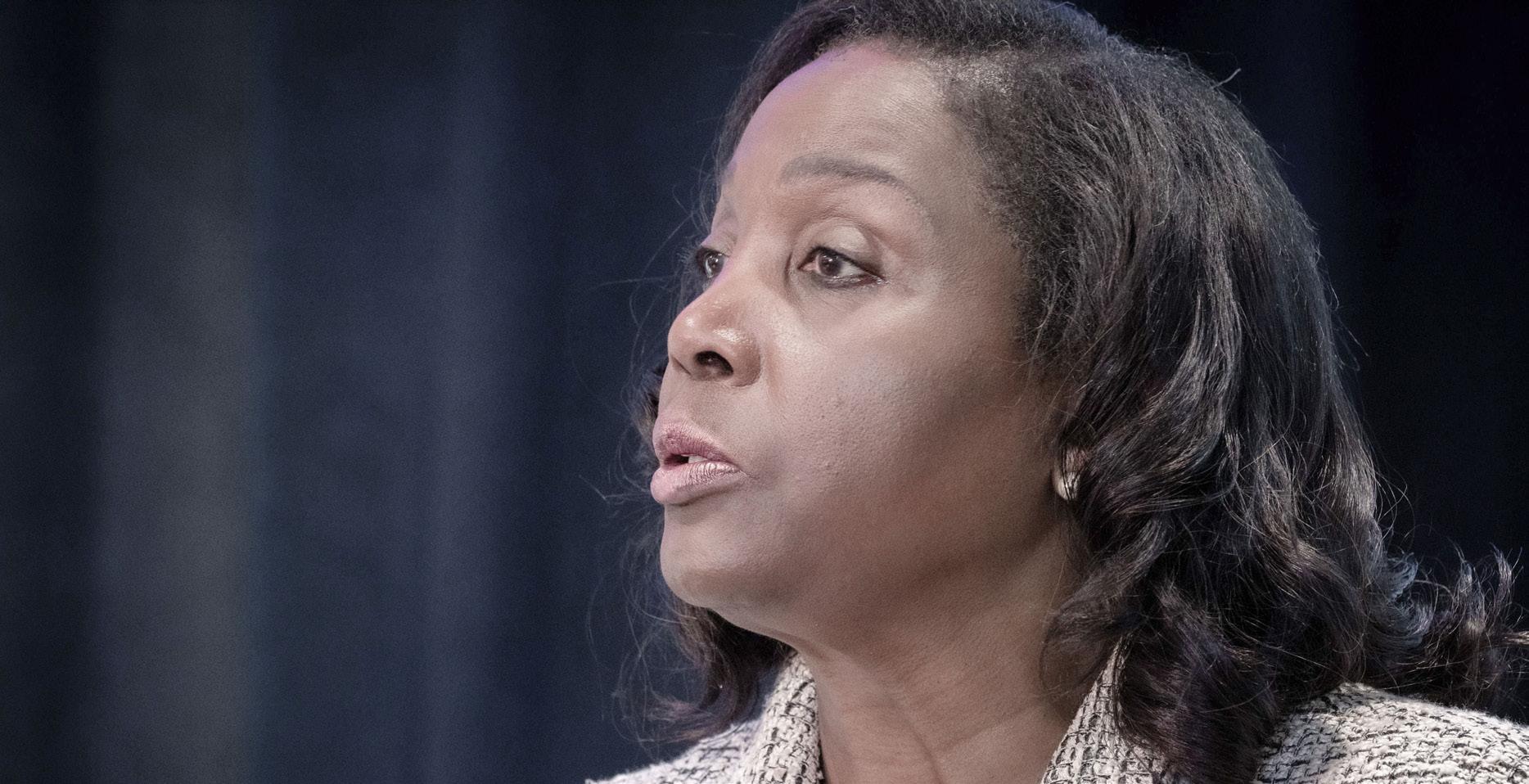
executive branch should be separate from the Fed, which sets interest rates and has been historically insulated from political pressure.
The Department of Justice has launched a criminal investigation into Cook based on the administration official’s allegations of mortgage fraud, the Associated Press reported Thursday. And, earlier last week, seven MSU professors joined a group of nearly 600 academics in signing onto an open letter that rebuked Trump’s attempted ouster, while supporting Cook and the independence of the Federal Reserve.
Trump’s “approach threatens the
fundamental principle of central bank independence and undermines trust in one of America’s most important institutions,” the letter said.
Weighty as the dispute may be, it largely doesn’t pertain to MSU, the university said.
Spokesperson Amber McCann said Cook’s status of unpaid leave at MSU is unaffected and that she’s unaware of any communication between the university and Cook since her dispute with Trump began.
“It wouldn’t be atypical that she’s not been in communication with the university,” McCann said. “I can’t speak to her communication with
colleagues, but I’m not aware of any official outreach from Lisa Cook to the university about the current circumstances.”
McCann added that the university does not comment on any pending litigation.
Angela Wilson, chair of the Faculty Senate, echoed the sentiment that the matter does not directly concern MSU, but added there’s no historical precedent for Trump’s attempted ouster of Cook and that it is a “highly unfortunate situation.”
A president has never before attempted to remove a sitting governor on the Federal Reserve
board, and Cook’s lawsuit notes that the entity’s founding statute stipulates the president can only terminate one “for cause.” Because the allegation of mortgage fraud has not been proven, and Cook has not been convicted of any crime, she argues Trump overstepped his authority in removing her.
The lawsuit did not, however, address why Cook listed two houses as a primary residence on mortgage flings, a discrepancy that Trump used to justify her removal from the Fed. Claiming a residence is one’s primary can secure more favorable mortgage terms. ProPublica reported last week that three of Trump’s cabinet members also call multiple homes their primary residences on their mortgages.
Trump has routinely chastised Fed chair Jerome Powell for not lowering interest rates in the face of rising infation. Cook has regularly voted with Powell on the matter. She argued in her suit that’s the root reason Trump moved to fre her.
“It is clear from the circumstances surrounding Governor Cook’s purported removal from the Federal Reserve Board that the mortgage allegations against her are pretextual, in order to effectuate her prompt removal and vacate a seat for President Trump to fll and forward his agenda to undermine the independence of the Federal Reserve,” the lawsuit said.
